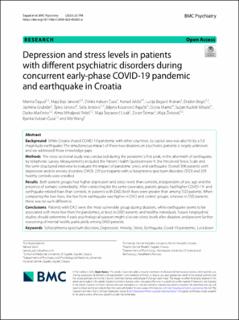Depression and stress levels in patients with different psychiatric disorders during concurrent early-phase COVID-19 pandemic and earthquake in Croatia
Šagud, Marina; Janović, Maja Bajs; Ćusa, Zrinka Vuksan; Jakšić, Nenad; Krakan, Lucija Bagarić; Begić, Dražen; Grubišin, Jasmina; Janović, Špiro; Jevtović, Saša; Kosanović Rajačić, Biljana; Mamić, Gloria; Mikulić, Suzan Kudlek; Marčinko, Darko; Peleš, Alma Mihaljević; Lisak, Maja Šeparović; Štimac, Zoran; Živković, Maja; Ćusa, Bjanka Vuksan; Wang, Wei
Peer reviewed, Journal article
Published version
Permanent lenke
https://hdl.handle.net/11250/3113099Utgivelsesdato
2023Metadata
Vis full innførselSamlinger
- Institutt for psykologi [3079]
- Publikasjoner fra CRIStin - NTNU [38015]
Sammendrag
Background
While Croatia shared COVID-19 pandemic with other countries, its capital area was also hit by a 5.6 magnitude earthquake. The simultaneous impact of these two disasters on psychiatric patients is largely unknown, and we addressed those knowledge gaps.
Methods
The cross-sectional study was conducted during the pandemic’s first peak, in the aftermath of earthquake, by telephonic survey. Measurements included the Patient Health Questionnaire-9, the Perceived Stress Scale and the semi-structured interview to evaluate the impact of pandemic stress and earthquake. Overall 396 patients with depression and/or anxiety disorders (DAD), 229 participants with schizophrenia spectrum disorders (SSD) and 205 healthy controls were enrolled.
Results
Both patient groups had higher depression and stress levels than controls, independent of sex, age and the presence of somatic comorbidity. After controlling for the same covariates, patient groups had higher COVID-19- and earthquake-related fears than controls. In patients with DAD, both fears were greater than among SSD patients. When comparing the two fears, the fear from earthquake was higher in DAD and control groups, whereas in SSD patients there was no such difference.
Conclusions
Patients with DAD were the most vulnerable group during disasters, while earthquake seems to be associated with more fear than the pandemics, at least in DAD patients and healthy individuals. Future longitudinal studies should determine if early psychological support might alleviate stress levels after disasters and prevent further worsening of mental health, particularly among DAD patients.

